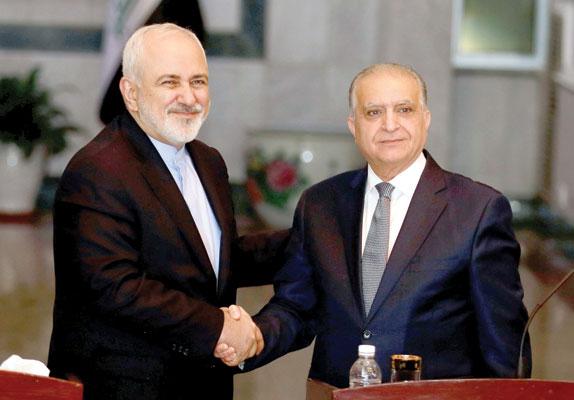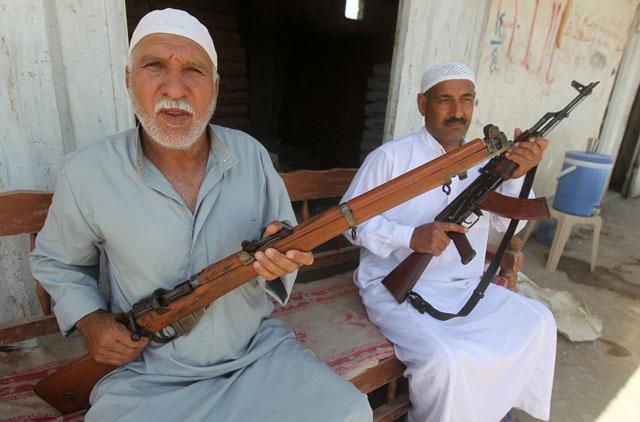You are here
Suleimani: Iran’s near invisible Quds Force commander
By AFP - Jul 02,2014 - Last updated at Jul 02,2014
NICOSIA — For a man widely reported to be playing a key role in helping Iraq’s routed military recover lost ground, Qassem Suleimani, the commander of Iran’s feared Quds Force, remains invisible.
It is not a new strategy for Suleimani — the 57-year-old is rarely pictured, a trait that chimes with his apparent, although officially denied, presence in Baghdad in the past fortnight.
Having already helped Syrian President Bashar Assad reverse the gains of Sunni-led rebels in that country’s civil war, just when it looked like Assad was finished, Suleimani has cultivated a reputation as perhaps the most formidable security operative in the Middle East.
With multiple media outlets stating that the enigmatic general is now in Iraq, where Prime Minister Nouri Al Maliki’s forces have as yet failed to repel a Sunni militant offensive, the political parallels are striking.
The jihadists laying siege to Maliki declared a “caliphate” — an Islamic system of government not seen since Ottoman times — on Monday.
Despite their limited numbers, they have led the occupation of Iraq’s second largest city Mosul and are fighting to hold Tikrit after a northern sweep shocking in both its speed and simplicity, with Iraqi troops melting away when confronted.
With the Iraqi military’s collapse all too visible, the presence of Sunni militants — now known as the Islamic State (IS) — near Iran’s border invokes fear in Tehran.
Bonded by Shiite Islam, Iran and Iraq have grown closer in the realms of government and security since the overthrow of Sunni leader Saddam Hussein in the US-led invasion of 2003.
Short in stature but feared on a grand scale, Suleimani joined Iran’s forces during the war Saddam launched against them in 1980, an eight-year conflict that left more than a million people dead.
Afterwards, he was sent to Iran’s eastern border to fight drug traffickers coming in from Afghanistan.
‘A living martyr’
He was named Quds commander in 1998 and in May 2005 was described by Iran’s ultimate authority, supreme leader Ayatollah Ali Khamanei, as “a living martyr”.
The Quds Force, a branch of the Revolutionary Guard, is highly secretive and conducts sensitive security functions abroad, such as intelligence, special operations and political action deemed necessary to protect the Islamic republic.
On the rare occasions he has spoken publicly, Suleimani’s obvious zeal has lived up to the air of mystique that has built up around his persona.
The few pictures of him show a face whose intense stare and focus sits within a closely cropped and greying beard.
His words have confirmed Iran’s regional reach.
“Iran has a presence in southern Lebanon and Iraq. In fact, those areas are in a way influenced by the Islamic Republic of Iran’s ideology and conduct,” he said in a speech carried by Iranian media in January 2012.
Two years later, he went further: “No force or country except for Iran is capable of leading the Muslim world today... due to Iran’s support for revolutionary and Islamic movements and fighters as well as its defence of Muslims against aggressors.”
Suleimani has history with Maliki
A diplomatic source told AFP: “He knows Syria like he was born there and has very good knowledge of Iraq.
“He is utterly respected by the Quds Force members, thanks to his career.”
A similar mission to the one he carried out in Syria would explain Suleimani’s presence in Baghdad, which has been denied by the foreign ministry in Tehran.
Moreover, Suleimani has history with Maliki.
Amid the political deadlock of Iraq’s inconclusive 2010 general election, the Iranian general allegedly organised a meeting in the shrine city of Qom, a two-hour drive south of Tehran.
It was at that meeting that Shiite cleric Moqtada Sadr — the one-time head of Iraq’s Mehdi Army militia turned political leader based in self-imposed exile in Iran at the time — agreed to support Maliki’s bid for the premiership.
The deal effectively completed Baghdad’s political power shift from Washington to Tehran, and was followed a year later by a complete exit of US troops from Iraq.
“All of the important people in Iraq go to see him,” Iraqi Deputy PM Saleh Al Mutlaq said of Suleimani in 2011.
The dark side of the Quds Force’s activities is never far from foreign headlines. Suleimani was accused by the US military in 2008 of training Iraqi hit squads. And Israel said he orchestrated attacks on Israeli tourists in the summer of 2012.
“He is indeed like Keyser Soze,” a senior US official told The Guardian newspaper in 2011, referring to the seemingly invisible character portrayed by Kevin Spacey in “The Usual Suspects”.
“Nobody knew who he was and this guy’s the same,” the official said of the Quds commander. “He is everywhere, but nowhere.”
Related Articles
BAGHDAD/GENEVA — President Hassan Rouhani's visit to Iraq this week is a strong message to the United States and its regional allies that Ir
Lebanon's Shiite movement Hizbollah said Friday that an Iranian elite unit commander led the anti-jihadist counterattack in Iraq after the Islamic State group made major advances in June.
The capture of Iraqi cities Mosul and Tikrit by Al Qaeda-influenced jihadis has not only redrawn the map of a country corroded by sectarian hatred.

















